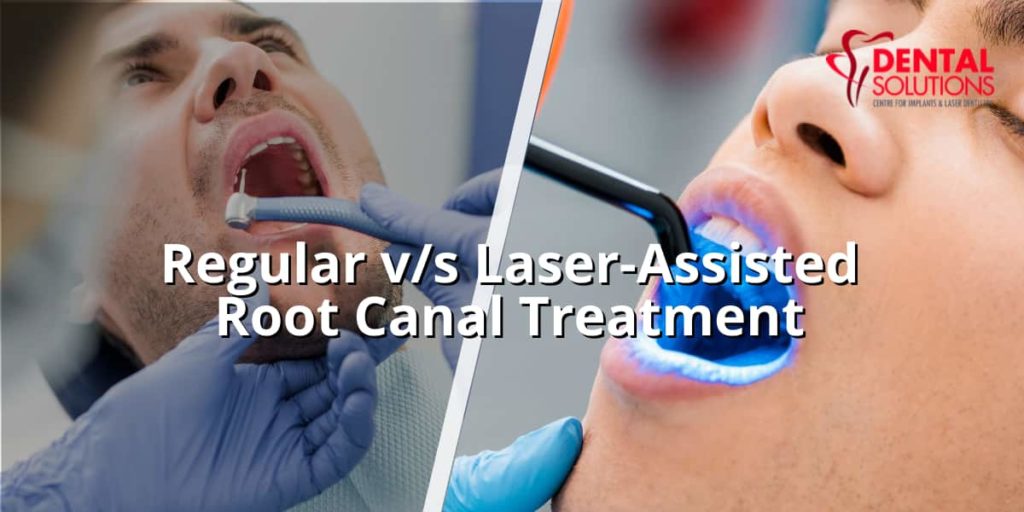- +917892951808
- Indiranagar, Bangalore
Best Dental Clinic In Bangalore Indiranagar | Best Dentist in Bangalore Indiranagar
- Home
- About Us
- Treatments
- Blog
- Contact Us
Regular V/S Laser Assisted Root Canal Treatment

The use of LASERs has been a successful practice in the medical field for decades. When it comes to dentistry, there has been a strong development of lasers in this field too. That's because lasers can be efficiently used to treat two of the most prevalent oral ailments: tooth decay and gum disease.
The popularity of using Lasers in dentistry is also linked to its safe and effective results in all dental treatments. The Food and Drug Administration (FDA) has approved the use of lasers by dentists and we are proud to be one of the dental clinics in Bangalore using laser technology for dentistry.
Among the few endodontic procedures that laser dentistry is used for, Root Canal Therapy (RCT) is one of the most common endodontic procedures. While drills and other dental tools have certainly been used for centuries to remove the infected pulp from a decayed tooth, the additional use of laser in the treatment has made quite the changes in the Root Canal Treatment.
Root canal procedure is one treatment that is feared by many. With the advent of lasers in endodontics, root canal therapy is no longer a scary dental procedure. Laser-Assisted Root Canal therapy has shown to be more beneficial compared to conventional root canal treatment in terms of pain and disinfection. Dental lasers offer a high degree of accuracy and safety compared to conventional methods.
What is the difference between conventional root canal therapy (RCT) and Laser assisted root canal therapy (RCT)?
Before we go further, let's briefly understand why root canals are performed?
If a tooth is seriously decayed or damaged, the pulp, a mass of connective tissue that resides within the center of the tooth, can get infected, inflamed and swell. This condition is called pulpitis and usually occurs when the protective layers of the tooth, and the dentin, are injured, leaving the root exposed. There are cases where the inflammation can be treated by treating the cavity or other correctable cause, however, a case of irreversible pulpitis often requires a root canal if the tooth can still be saved. Root canal treatment is a common dental procedure used to save an abscessed or infected tooth and prevent the need for dental implants or bridges.
To save a tooth affected by pulpitis, patients should seek prompt treatment and should immediately consult a dentist if the following signs and symptoms are noticed:
- Tooth sensitivity
- Inflammation and pain around a decayed tooth
- Bad breath
- Fever and swollen lymph nodes
With conventional Root Canal Treatment, there are challenges with guaranteeing that the entire affected area has been disinfected fully. Hence, reinfection is very much possible. However, when conducting laser-assisted root canal therapy, reinfection rates are drastically reduced.
How does a laser work?
The laser emits an energy beam that can cut into all sorts of materials like teeth and gum tissue. The laser treatment works by producing non-thermal photoacoustic shock waves – i.e. it uses two laser wavelengths Er: YAG and Nd: YAG,/Diod making the best use of the unique laser-tissue interaction features of each wavelength. Er: YAG induces shock waves in the cleaning solutions and Nd: YAG has a superior bactericidal effect. The canals and accessory canals are clean debris consisting of bacteria and infection. When the laser is introduced into the tooth access, you see the solution pulsating with the debris of dead tissue streaming out of the access hole making the canals free of dead tissues.
Lesser pain with Laser assisted Root Canal Treatment
Traditional root canal treatment follows cleaning and disinfection of root canals by mechanical debridement and using chemical agents like chlorhexidine, sodium hypochlorite etc. However, this chemical-mechanical approach may not always achieve complete sterilization. And in most cases may lead to reinfection and rarely, failure of root canal therapy. When lasers are used in addition to these chemo-mechanical methods to ensure complete disinfection of the root canals, they seize infection and effectuate a sterile atmosphere in the infected root canals.
Laser-assisted root canal treatment has a high level of precision and allows dentists to target specific areas that are being worked on without harming the surrounding gum tissue. Additionally, most procedures performed with lasers do not require anaesthesia. If pain is something that makes you nervous about undergoing root canal therapy, talk to your dentist about laser-assisted Root Canal therapy. However, please remember, Laser-assisted Root Canal Treatment does not eliminate pain completely, the pain is simply much lesser compared to conventional methods.
Favorable results with laser-assisted Root Canal Treatment
The efficacy of laser-activated irrigation of root canals when compared with conventional irrigation to disinfect shows favourable results for the laser technology. Laser-activated irrigation for destroying bacteria and blocking new bacterial growth is more effective than conventional irrigation.
Advantages of Laser assisted root canal treatment over traditional root canal treatment
- Laser treatment is precise and more accurate than conventional root canal therapy. The traditional RCT methods can make it difficult for the drill to reach small cavity areas and clean the infected area. Due to incomplete cleaning of the canal space, reinfection can occur and in the later stages, it might be difficult to save the tooth.
Lasers have the ability to target even the smallest of the smallest cavities (deeper pockets) and target bacteria and the infected area with greater accuracy, preserving healthier tooth structure and ensuring it is completely disinfected. Bottom line, laser-assisted RCT helps in the reduction of at least 99% bacteria as the root canal approaches sterilization. Since the laser has the ability to reach and clean the accessory canal, the root canal sealer can reach right at the bottom of the root canal which results in a better seal of the root canal.
- With laser-assisted RCT, the tooth will be stronger and have adequate protection against further decay and damage.
- Laser-assisted RCT helps in reducing the risk of re-infection. It also helps in keeping the removal of dentinal tissue to a minimum.
- There is reduced use of drills in laser-assisted treatment and comparatively less pain.
- Reduces postoperative discomfort and infection.
- The cavity prepared using laser-assisted root canal treatment lasts longer.
Talk to your dentist or endodontist about laser-assisted root canal therapy to suit your specific root canal therapy needs. Save your tooth and that beautiful smile with a laser root canal procedure at Dental Solutions Bangalore.
